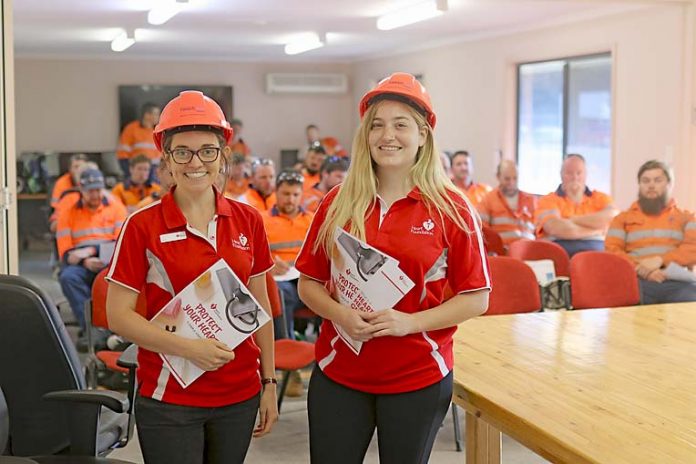

THE Heart Foundation is targeting Limestone Coast workplaces in a bid to reduce the amount of heart-related medical conditions in the region.
Mount Gambier is considered a high-risk area by the foundation, with data showing it is the second-highest local government area in the state for heart-related hospital admissions.
Over 100 employees from the Timberlink Australia’s Tarpeena mill were among those to undergo a foundation work program, encouraging employees to seek regular health checks.
Held in line with the company’s Safe Start day, employees learned about the importance of routine heart checkups given they can assess how likely a person is to have a heart attack or stroke in the next five years.
Heart Foundation public health registrar Kate Murton said research showed the risk of heart-related illnesses, including heart disease and heart attacks, increases in rural areas.
“Mount Gambier residents specifically rank lower in exercise and obesity is higher when comparing to the rest of the state,” Ms Murton said.
“This checkup allows us to identify the risk and then the client would be able to manage the specific risk factors to lower the risks of heart disease.”
Data released by the foundation in October showed Mount Gambier’s obesity level was 37pc, higher than the national average of 28pc and up to 73pc of residents were not meeting the minimal physical activity standard of exercising for 30 minutes per day.
Ms Murton said the heart checkup service was relatively new to the healthcare system, being introduced to the public in April last year.
“Main symptoms for heart disease are silent including blood and cholesterol,” she said.
“This is why it is important to have a checkup as you often do not know until it is too late and somebody is having a heart attack.”
During the worksite presentation, Ms Murton said vital information was spoken about how to act during the event of a heart attack.
“We know one in three people who are symptomatic of a heart attack do not call 000 and another one in three wait longer than eight hours to call 000 or seek medical help,” she said.
“We know time is muscle so the longer somebody leaves it, the longer it will be for them to recover or lower the chance they will survive a heart attack especially in a rural area.
“We want to tell people not to wait any longer than 10 minutes after recognising symptoms and to call 000.”
Timberlink Tarpeena mill site injury management, health and wellbeing manager Kevin Wilhelm said many people who worked on site were over the age of 40 he and wanted to keep them informed.
“Along with the Heart Foundation, we have a whole calendar of programs we are trying to roll out,” Mr Wilhelm said.
“Out of all of this, I would just like one worker to come to me and say they are thankful they went and had a checkup.”
Long-serving employee Peter Durbidge said it was important to keep on top of your heart health.
“It can save your life and it only takes a couple of minutes,” he said.
“I think many people learnt something from the presentation.
“I hope my co-workers do take advantage of a free checkup if they have the opportunity.”
Ferrers Medical Clinic offered free heart health checkups to workers involved in the foundation initiative.







